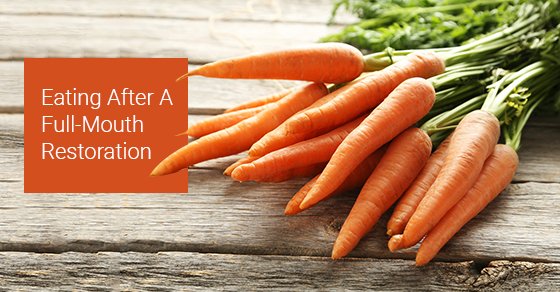A full-mouth restoration consists of various treatments that improve your smile and enhance your dental health.
Undergoing a full-mouth restoration corrects a number of common dental issues while providing the aesthetic results you’ve always wanted. It’s important to understand the procedure as well as the considerations that you’ll need to make after you’ve undergone treatment.
Knowing the five foods to avoid after full-mouth restoration is an important part of the healing process.
What is a Full-Mouth Restoration?
A full-mouth restoration consists of various procedures that correct any of the following issues:
- Tooth loss
- Damage from trauma or decay
- Faulty joint alignment and mechanics
- Bone loss
- Gum damage
- Disease treatment
- Replacement of previous dental work
Although these issues may be addressed individually, it’s often necessary to perform them all at once through a full-mouth restoration. This includes the application of crowns, fillings, implants, veneers, tissue grafting, and other treatments.
A full mouth restoration represents a combination of reconstructive dentistry with cosmetic treatments to restore the patient’s dental health.
Risks When Eating After a Full-Mouth Restoration
Chewing when eating can present a risk to your teeth after a full-mouth restoration. The forces produced during chewing and grinding movements place a high level of stress on the surfaces of the teeth and lead to the risk of fractures.
Any numbness that occurs after your procedure will pass with time. But it’s a good idea to avoid eating hard foods during this time so that you don’t accidentally cause damage.
The following are five things to avoid chomping on after your full-mouth restoration:
- Ice
- Carrots
- Apples
- Hard breads
- Hard candies
Your dentist will make any adjustments to establish a proper bite after your treatment. Avoiding these things prevents unwanted issues that can affect your bite. This gives you the results you’re after and minimizes any risks.
What to Expect After a Full Mouth Restoration
You may also experience fatigue of the muscles of the mouth while they recover from your treatment. The first two to three days should consist of soft foods that minimize the impact of chewing.
Soft foods don’t require as much chewing and reduce the stress placed on the teeth and supporting structures. Over time, you’ll introduce harder foods, as you’re able to tolerate them.
The age of a patient can influence the recovery process. Faster recovery periods are common among younger patients while older individuals have an increased risk of unwanted issues.
Your doctor will help you choose the options that are best suited to your needs and specific case. Pre-existing conditions should be considered prior to a full-mouth restoration.
Understanding the procedures of a full-mouth restoration makes the recovery process easier. Avoiding the foods listed above prevents the risk of damage so that you achieve the results that lead to lasting dental health.
